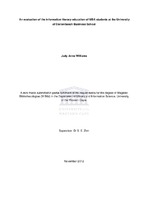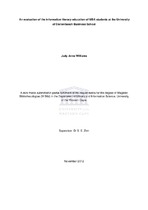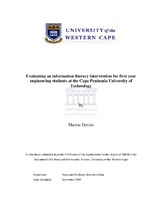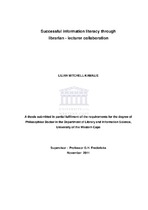| dc.contributor.advisor | Zinn, Sandy | |
| dc.contributor.author | Williams, Judy Anne | |
| dc.date.accessioned | 2014-05-26T13:47:03Z | |
| dc.date.available | 2014-05-26T13:47:03Z | |
| dc.date.issued | 2012 | |
| dc.identifier.uri | http://hdl.handle.net/11394/3233 | |
| dc.description | Magister Bibliothecologiae - MBibl | en_US |
| dc.description.abstract | This study investigates the effectiveness of the information literacy education that Master of Business Administration (MBA) students receive at the University of Stellenbosch Business School (USB). The literature reveals that there is a growing trend worldwide to extend information literacy education to include graduate students. The study uses the Association of College and Research Libraries (ACRL) Information Literacy Standards for Higher Education Competencies as the theoretical framework together with Kuhlthau’s Information Search Process. Both process and formative evaluation was used in the study. A mixed method approach was applied to gather data for the study using a pre- and post-information literacy questionnaire, interviews with the information literacy facilitator and the research methodology lecturer and a rubric assessment of students’ group assignment. The information literacy intervention focuses mainly on ACRL Standard 1, with more emphasis on ACRL Standard 2. ACRL Standards 3, 4 and 5 were briefly mentioned as it was difficult to cover all the ACRL Standards adequately within a once-off information literacy session. The results of the study show that the information literacy intervention was successful in introducing students to some of the electronic resources which is one of the major objectives
of the intervention. Students’ scores in the pre- and post-information literacy questionnaire and the group assignment were high. This could be an indication that the information literacy intervention was a success. The interviews with the information literacy facilitator and the research methodology lecturer reveal that little collaboration between the library and business academics is taking place. This lack of collaboration affects the quality of the information literacy education in terms of business academics input in the information literacy intervention and in terms of reinforcing information literacy outcomes in students’ assignments. One of the recommendations is that collaborative relationships should be developed between the library and business academics in order to develop an information literacy plan that will fully integrate information literacy within Masters’ courses. | en_US |
| dc.language.iso | en | en_US |
| dc.publisher | UWC | en_US |
| dc.subject | Information literacy | en_US |
| dc.subject | Information literacy assessment | en_US |
| dc.subject | Information literacy education | en_US |
| dc.subject | Information literacy intervention | en_US |
| dc.subject | Information literacy standards | en_US |
| dc.subject | Higher education | en_US |
| dc.subject | Post-graduate students | en_US |
| dc.subject | Business education | en_US |
| dc.subject | Master of Business Administration | en_US |
| dc.subject | Evaluation research | en_US |
| dc.title | An evaluation of the information literacy education of MBA students at the University of Stellenbosch Business School | en_US |
| dc.type | Thesis | en_US |
| dc.rights.holder | UWC | en_US |




